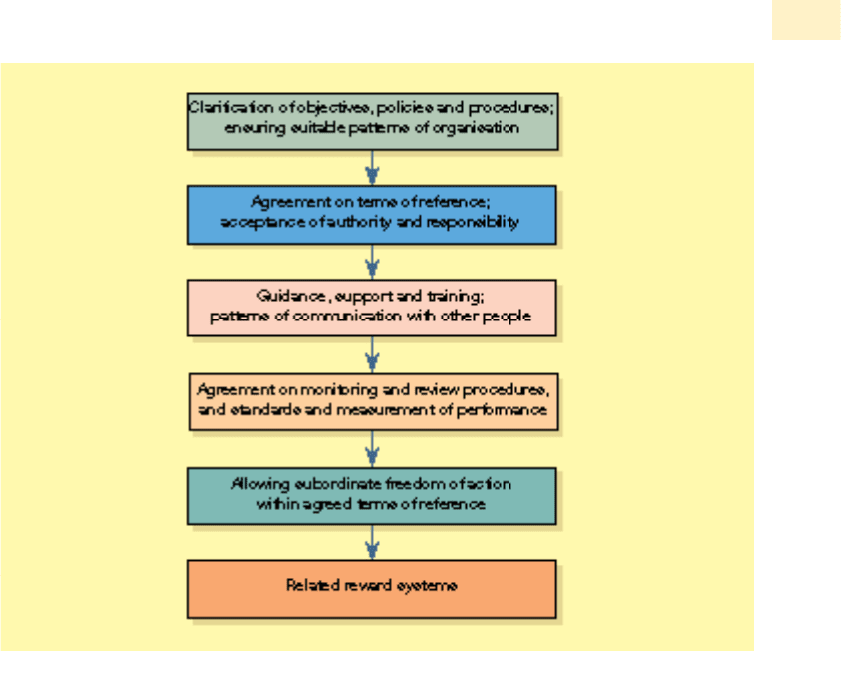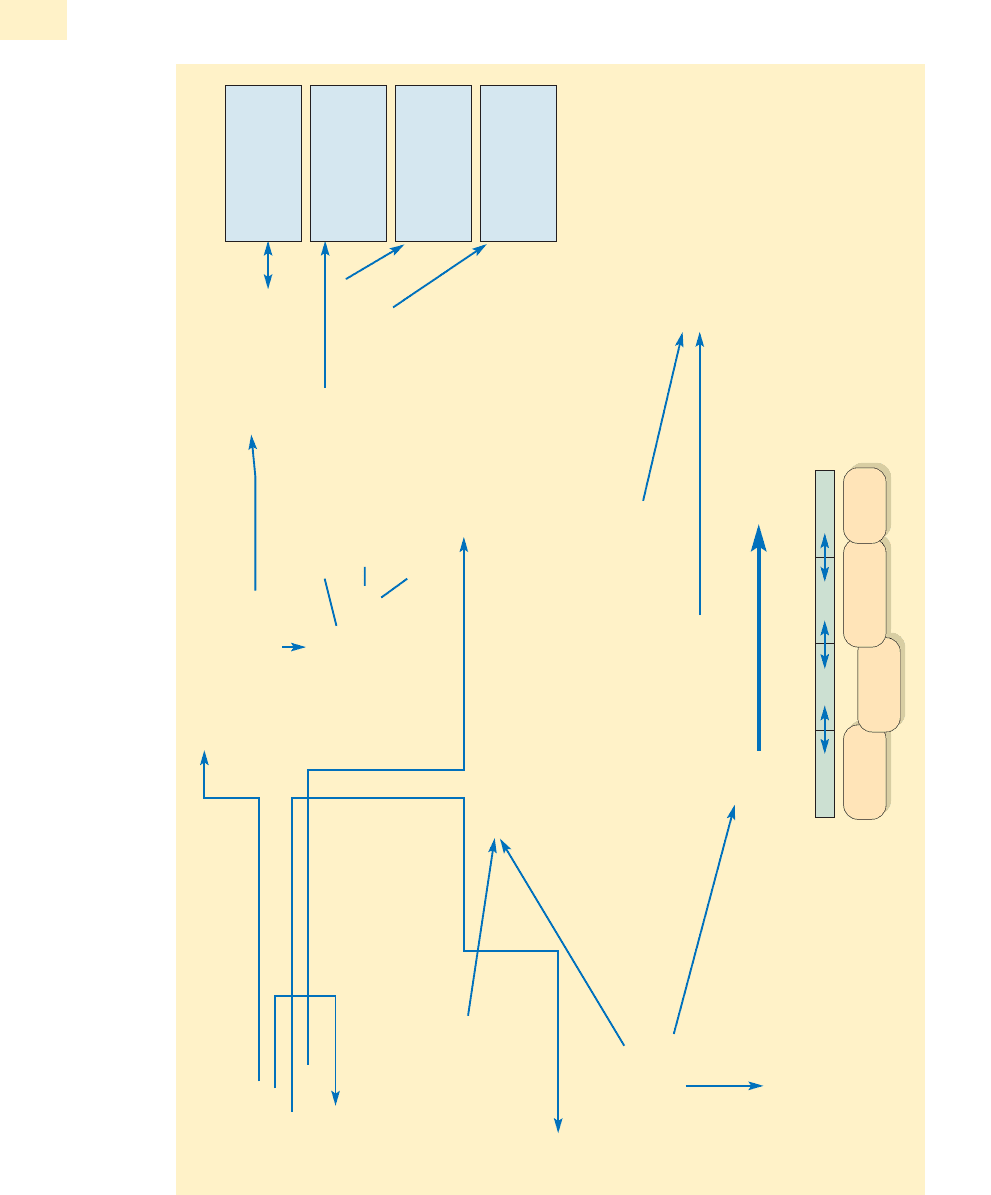Mullins L.J. Management and organisational behaviour, Seventh edition
Подождите немного. Документ загружается.


nates accept the extent of, and any restrictions on, the authority and responsibility
delegated to them. Subordinates should feel a sense of commitment to their new tasks
or assignments and free to discuss any doubts or concerns. Delegation involves the
acceptance theory of authority. Davis and Newstrom explain this as follows:
Although authority gives people power to act officially within the scope of their delegation, this
power becomes somewhat meaningless unless those affected accept it and respond to it. In most
cases when delegation is made, a subordinate is left free to choose a response within a certain
range of behaviour. But even when an employee is told to perform one certain act, the employee
still has the choice of doing it or not doing it and taking the consequences. It is, therefore, the
subordinate who controls the response to authority. Managers cannot afford to overlook this
human fact when they use authority.
71
When subordinates have agreed and accepted the delegation, they should be properly
briefed, given guidance and support and any necessary training. They should be
advised where, and to whom, they could go for further advice or help. The manager
should make clear to other staff the nature and extent of delegation, and obtain their
co-operation. Where the delegation is likely to involve contact or consultation with
people in other departments or sections or requests for information, the manager
should also communicate with other managers and seek their consent and support.
The simple process of smoothing the pattern of communications should ordinarily
require little effort by the manager. Not only is it a courtesy but also it can do much to
enlist the co-operation of other staff and help avoid any possible misunderstandings.
The manager should agree time limits for delegation (such as a target date for comple-
tion of a specific task or a specified time period). It is necessary to agree the level and
nature of supervision, and to establish a system to monitor progress and provide feed-
CHAPTER 21 ORGANISATIONAL CONTROL AND POWER
855
Figure 21.6 Main stages in the process of delegation
Guidance,
support and
training
Monitoring
and review
procedures

856
PART 8 IMPROVING ORGANISATIONAL PERFORMANCE
Zone of
INSTRUCTION
DELEGATION, AUTHORITY, POWER & RESPONSIBILITY
• DELEGATION
• AUTHORITY
• POWER
• RESPONSIBILTY
AUTHORITY
The RIGHT to authority
• Given to the subordinate to do the manager’s job
(otherwise formal organisations cannot exist)
• Extent of delegated authority
Anything the manager has the right to do
(except where the manager is specifically prohibited from doing)
• Cannot totally delegate authority of performing the managerial
functions viz: planning
organising
motivating
communicating
controlling
POWER
The ABILITY to influence another
measured in terms of:
• giving rewards
• promising rewards
• threat to withdraw current rewards
• withdrawing current rewards
• threat of punishment
• punishing
Influenced by
• Subjective factors – ethical/moral. For example,
how much power should a manager have?
• Extent of power significantly determined by the
person being controlled.
• May be more important what a person thinks the
manager’s power is than what it actually is.
DELEGATION OF AUTHORITY & POWER
Authority & Power relationships
A manager must possess both otherwise
conflict occurs. Subordinates must be
provided with equal authority & power at
all levels of an organisation.
= legitimate power or workable authority
• Managers have the right to require
accounting for the authority delegated
& tasks assigned to a subordinate.
• Subordinates must answer to the
manager concerning the stewardship
of the authority granted to him or her
by the manager.
Zone of
DELEGATION
Zone of
EMPOWERMENT
POWER
Management
loses control
Management
controls every detail
ALL RETAINED
BY MANAGEMENT
NONE RETAINED
BY MANAGEMENT
EFFECTIVE DELEGATION
• Understanding the task
• Identifying the correct
person(s) to perform the
task
• Communicating the task
• Setting & discussing the
objectives for the task
• Monitoring progress
• Evaluation & feedback
RESPONSIBILITY
• The obligation to do something.
• The duty to perform the job or
function in the organisation.
• An individual’s obligation to her-
or himself to perform the task.
• Responsibility cannot be delegated.
• Delegating authority can increase
the manager’s responsibility since
there is additional responsibility
for the subordinate’s task.
BENEFITS OF EFFECTIVE DELEGATION
• Efficient use of manager’s
and subordinates’ time
• Motivation of staff
• Development of staff
• Reducing levels of stress in managers
and subordinates
RESPONSIBILITY & ACCOUNTABILITY
• Accountability – a person is
accountable to higher authorities
• Responsibility is created within a
person when accepting a task &
the appropriate delegation of
authority
Zone of
ANARCHY
• EFFECTIVE DELEGATION
• REASONS FOR INEFFECTIVE DELEGATION
INEFFECTIVE DELEGATION
• Heavy work loads
• Lack of appropriate staff
• Unfamiliarity with the task
• Personal characteristics
• Fear of subordinate doing
undesirable things
• Liking by the manager for
the actual job
of – manager
– subordinate
– staff not trained
– staff not in post
of – manager
– subordinates
DELEGATION
‘Delegation is part of the managerial function
involving some element of risk’
Both the delegator &
the person(s) to whom
the work is delegated
Using appropriate
communication methods
• Verbal/Written/
Diagrammatic
Objectives require
• time scales
• quality of the results
to be quantified
Based on
• Previous performance
• Special skills
• Special circumstances
Figure 21.7 Summary outline of delegation, authority, power and responsibility
(Adapted and reproduced with permission of Training Learning Consultancy Ltd, Bristol.)

back. It is also important to agree response deadlines, check points and specific times
to meet, and the review of performance within the agreed terms of reference: for ex-
ample, to discuss progress with the manager at the end of each week, or to discuss the
first draft of a report before it progresses further, and by an agreed date. Delegation is
not an irrevocable act; it can always be withdrawn. It is also important to make
clear expected levels of achievement and agree on performance standards (wherever
practically possible in quantitative terms), and how performance in each area is to be
measured and evaluated.
The subordinate should then be left alone to get on with the job. One of the most frus-
trating aspects of delegation is the manager who passes on authority but stays close
behind the subordinates’ shoulders keeping a constant watch over their actions. This is
contrary to the nature of delegation. The true nature of successful delegation means
that the subordinate is given freedom of action within the boundaries established
and agreed in the previous stages.
A planned and systematic approach means that effective delegation can be achieved
within the formal structure of the organisation and without loss of control. Modern
methods of management can also assist the effectiveness of delegation. Procedures
such as management by exception and staff appraisal are useful means of helping to
maintain control without inhibiting the growth of delegation. Delegation can be
increased under a system of Management by Objectives which allows staff to accept
greater responsibility and to make a greater personal contribution.
Wherever possible, the process of delegation should be related to some form of associ-
ated ‘reward’ system. Examples could include bonus payments, improved job
satisfaction, reduction of work stress, and enhanced opportunities for promotion or
personal development, including further delegation. A ‘summary outline’ of delega-
tion, authority, power and responsibility is presented in Figure 21.7.
The art of delegation is to agree clear terms of reference with subordinates, to give them
the necessary authority and responsibility and then to monitor their performance with-
out undue interference or the continual checking of their work. Effective delegation is a
social skill. It requires a clear understanding of people-perception, reliance on other
people, confidence and trust, and courage. It is important that the manager chooses the
right subordinates to whom to delegate authority and responsibility. The manager must
know what to delegate, when and to whom. Matters of policy and disciplinary power,
for example, usually rest with the manager and cannot legitimately be delegated.
Delegation is a matter of judgement and involves the question of discretion.
Delegation is also a matter of confidence and trust – both in subordinates and the
manager’s own performance and system of delegation. In allowing freedom of action
to subordinates within agreed terms of reference and the limits of authority, man-
agers must accept that subordinates may undertake delegated activities in a
different manner from themselves. This is at the basis of the true nature of delega-
tion. However, learning to put trust in other people is one of the most difficult aspects
of successful delegation for many managers, and some never learn it.
Delegation is also a matter of courage. If a subordinate comes to a manager with a
problem the manager should insist on a recommendation from the subordinate.
Delegation involves subordinates making decisions. For example, as Guirdham points
out: ‘A strict separation of manager and subordinate roles sends the message to workers
CHAPTER 21 ORGANISATIONAL CONTROL AND POWER
857
Freedom of
action
Related reward
‘systems’
Confidence
and trust
Training and
learning
experience
THE ART OF DELEGATION

that they are only responsible for what they are specifically told to do. Managers who
neglect to, or cannot, delegate are failing to develop the human resources for which
they have responsibility.’
72
Mistakes will inevitably occur and the subordinate will need to be supported by the
manager, and protected against unwarranted criticism. The acceptance of ultimate
responsibility highlights the educational aspect of the manager’s job. The manager
should view mistakes as part of the subordinate’s training and learning experience, and
an opportunity for further development. ‘Even if mistakes occur, good managers are
judged as much by their ability to manage them as by their successes.’
73
Notwithstanding any other consideration the extent and nature of delegation will ultimately
be affected by the nature of individual characteristics. The ages, ability, training, attitude,
motivation and character of the subordinates concerned will, in practice, be major determi-
nants of delegation. An example is where a strong and forceful personality overcomes the
lack of formal delegation; or where an inadequate manager is supported by a more compe-
tent subordinate who effectively acts as the manager. Failure to delegate successfully to a
more knowledgeable subordinate may mean that the subordinate emerges as an informal
leader and this could have possible adverse consequences for the manager, and for the
organisation. Another example, and potential difficulty, is when a manager is persuaded to
delegate increased responsibility to persons in a staff relationship who may have little
authority in their own right but are anxious to enhance their power within the organisation.
The need for control
The concept of ultimate responsibility gives rise to the need for effective management
control over the actions and decisions of subordinate staff. Whatever the extent of their
delegated authority and responsibility, subordinates remain accountable to the manager
who should, and hopefully would, wish to be kept informed of their actions and deci-
sions. Subordinates must account to the manager for the discharge of the responsibilities
which they have been given. The manager will therefore need to keep open the lines of
delegation and to have an upward flow of communication. The manager will need to be
kept informed of the relevance and quality of decisions made by subordinates.
The concept of accountability is therefore an important principle of management.
The manager remains accountable to a superior not just for the work carried out per-
sonally but also for the total operation of the department/section. This is essential in
order to maintain effective co-ordination and control, and to maintain the chain of
command. Successful delegation involves ‘letting go without losing control’.
74
Authority, responsibility and accountability must be kept in parity throughout the
organisation. The manager must remain in control. The manager must be on the look-
out for subordinates who are more concerned with personal empire building than with
meeting stated organisational objectives. The manager must prevent a strong personal-
ity exceeding the limits of formal delegation.
We have said that delegation creates a special manager–subordinate relationship.
This involves both the giving of trust and the retention of control.
The essence of the delegation problem lies in the trust–control dilemma. The dilemma is that in
any one managerial situation, the sum of trust + control is always constant. The trust is the trust
that the subordinate feels that the manager has in him. The control is the control that the man-
ager has over the work of the subordinate.
75
Control is, therefore, an integral part of the system of delegation. However, control
should not be so close as to inhibit the effective operation or benefits of delegation. It
is a question of balance. (See Figure 21.8.)
858
PART 8 IMPROVING ORGANISATIONAL PERFORMANCE
Individual
characteristics
A question
of balance

In Chapter 18, we discussed how getting the best out of people and attempting to
improve job satisfaction demands a spirit of co-operation and allowing people a
greater say in decisions that affect them at work. Managers need to relinquish close
control in favour of greater empowerment of employees. This gives members of staff a
sense of personal power and control over their work and responsibility for making
their own decisions.
CHAPTER 21 ORGANISATIONAL CONTROL AND POWER
859
THE CONCEPT OF EMPOWERMENT
Figure 21.8 The balance between delegation and control

Despite the general movement towards less mechanistic structures and the role of
managers as facilitators there appears to be some reluctance especially among top man-
agers to dilute or weaken hierarchical control. A study of major UK businesses suggests
that there are mixed reactions to the new wave of management thinking. While the
prospect of empowerment can hold attractions for the individual employee, many
managers are keen to maintain control over the destiny, roles and responsibilities of
others. Beneath the trappings of the facilitate-and-empower philosophy the command-
and-control system often lives on.
76
However, in a discussion on modern leadership and management, Gretton makes the
point that: ‘ Today’s leaders understand that you have to give up control to get results.
That’s what all the talk of empowerment is about.’
77
As Ellis and Dick point out, all human relationships embody an element of power
and in mature relationships power is allowed to shift between parties in accordance
with who is the most appropriate person to hold power.
In any organizational setting power relations are crucial in determining the way managers and
subordinates work together. When power is held totally in the hands of the manager or owner,
because they have ultimate power to employ or dismiss or they control all the resources that
employees use, the temptation to employ a dictatorial style of management will be strong. At the
other extreme, if employees have organizational power through their ownership of intellectual
skills, information or ability, a more consensual or partnership style of management would be
more appropriate.
78
According to a report from the Chartered Management Institute, younger managers (aged
25–35) positively seek empowerment at work. Along with confidence to take charge of
their own careers, these younger managers also expect a new employer–employee working
relationship, built on partnership and trust. Their preferred management style is one that
empowers, in contrast to the bureaucracy and authoritarianism that still prevails in many
organisations.
79
The meaning of empowerment
Empowerment
is generally explained in terms of allowing employees greater freedom,
autonomy and self-control over their work, and responsibility for decision-making.
However, there are differences in the meaning and interpretation of the term ‘empower-
ment’. Wilkinson refers to problems with the existing prescriptive literature on
empowerment. The term ‘empowerment’ can be seen as flexible and even elastic, and has
been used very loosely by both practitioners and academics. Wilkinson suggests that it is
important to see empowerment in a wider context. It needs to be recognised that it has dif-
ferent forms and should be analysed in the context of broader organisational practice.
80
Perceptions of empowerment also differ depending on your management position.
Companies are failing to match their promises of employee involvement with action and
many companies are only paying lip-service to real involvement.
81
The concept of empowerment also gives rise to the number of questions and doubts.
For example, how does it differ in any meaningful way from other earlier forms of
employee involvement? Is the primary concern of empowerment getting the most out
of the workforce? Is empowerment just another somewhat more fanciful term for dele-
gation? Some writers see the two as quite separate concepts whilst other writers suggest
empowerment is a more proactive form of delegation. Johnson and Redmond view
empowerment as the pinnacle of employee involvement and at the end of a chain in
social participation.
82
According to Mills and Friesen, ‘Empowerment can be succinctly defined as the
authority of subordinates to decide and act’.
860
PART 8 IMPROVING ORGANISATIONAL PERFORMANCE

It describes a management style. The term is often confused with delegation but, if strictly
defined, empowerment goes much further in granting subordinates authority to decide and act.
Indeed, within a context of broad limits defined by executives, empowered individuals may even
become self-managing.
83
Managerial initiatives and meanings
By employing and adapting terms used in the wider literature on empowerment,
Lashley suggests it is possible to summarise four managerial initiatives and meanings
which claim to be empowering:
■ empowerment through participation – for example, the delegation of decision-
making which in a traditional organisation would be the domain of management;
■ empowerment through involvement – for example, when management’s concern
is to gain from employees’ experiences, ideas and suggestions;
■ empowerment through commitment – for example, through greater commitment
to the organisation’s goals and through improvement in employees’ job satisfaction;
■ empowerment through de-layering – for example, through reducing the number
of tiers of management in the organisation structure.
Empowerment takes a variety of forms. Managers frequently have different intentions
and organisations differ in the degree of discretion with which they can empower
employees. Lashley concludes therefore that the success of a particular initiative will be
judged by the extent to which the empowered employees feel personally effective, are
able to determine outcomes and have a degree of control over significant aspects of
their working life.
84
A full discussion on the meaning and nature of empowerment is given in
Management in Action 21.1 at the end of this chapter.
True empowerment
Stewart suggests that to support true empowerment there is a need for a new theory of
management – Theory E – which states that managers are more effective as facilitators than
as leaders, and that they must devolve power, not just responsibility, to individuals as well
as groups.
85
Morris, Willcocks and Knasel believe, however, that to empower people is a real
part of leadership as opposed to management and they give examples of the way empower-
ment can actually set people free to do the jobs they are capable of.
86
Both make the point,
however, that true empowerment is much more than conventional delegation.
CHAPTER 21 ORGANISATIONAL CONTROL AND POWER
861
The Police Service has statutory responsibility for the
treatment of persons detained by them (and other agen-
cies such as Customs & Excise who bring persons into a
police station). These persons must be treated in accor-
dance with the Police & Criminal Evidence Act 1984
(PACE) which was enacted in January 1986 and any code
of practice issued under the Act (of which there are cur-
rently five, codes A–E with code C specifically relating to
issues of detention).
Section 39 of PACE specifies that these duties should
be the duty of the custody officer at a police station. The
same section goes on to declare where:
a) an officer of higher rank than the custody officer
gives directions ... which are at variance with any
decision or action taken by the custody officer in
the performance of a duty imposed on him under this
Act the matter shall be referred at once to an officer
of the rank of Superintendent or above who is
responsible for that police station.
There is then statutory backing for the decisions and
actions taken by a custody officer in the performance of
his duties.
PACE sets out the provisions regarding the appointment
of custody officers (Section 36). Custody officers are
Empowerment and the custody officer
EXHIBIT 21.1

862
PART 8 IMPROVING ORGANISATIONAL PERFORMANCE
appointed to designated police stations, which are effec-
tively police stations equipped to receive and house
detained persons in the conditions that PACE requires.
Subject to limited exceptions all detained persons must go
to a designated police station. Custody officers are
appointed by the Chief Officer of Police for that area or by
an officer directed by that Chief Officer of Police to do so.
Importantly no police officer may be appointed a Custody
Officer unless at least the rank of Sergeant and significantly
none of the functions of a Custody Officer shall be per-
formed by an officer who is involved in the investigation of
an offence for which the person is in detention (and there is
case law that identifies what being involved in an investiga-
tion entails).
Most forces have adopted the Sergeant rank as the best
suited to the custody officer role. Here in Hampshire that is
the case. Sergeants on appointment receive training in the
role of Sergeant and specifically custody officer duties.
They then undertake a process of accreditation as a cus-
tody officer which lasts from three to twelve months.
Custody officers, though they work for the same organisa-
tion, have an element of impartiality through the statement
that they must not be involved in the investigation of an
offence for which that person is detained. This allows for
their decision-making to be non-partisan. There is an argu-
ment perhaps that for the decision-making to be
completely impartial custody provisions should be inde-
pendent of the police service but in practice I would argue
custody officers value their impartiality and their decision-
making is reflected in this.
The Act clearly defines the process for any challenge to
custody officers’ decision-making and that is by appeal to
the station commander, a Superintendent. As well as pro-
viding support for custody officers in their decision-making
it also affords protection for them from rank pulling in a
hierarchically structured organisation such as the police.
PACE separates the decisions to be taken by custody
officers into two areas before and after charge.
Before
A custody officer has to determine whether there is suffi-
cient evidence to charge and may detain a person in order
to do so. If there is not sufficient evidence to charge then
the custody officer should release that person either with or
without bail unless their detention is necessary to preserve
and secure evidence relating to an offence for which they
are under arrest or to obtain such evidence by questioning.
Bail can be conditional, for example imposition of a curfew,
a condition of residence, reporting to a police station. All of
these conditions have to be justified and there is a course
of appeal to magistrates.
After
Custody officers shall order detained persons’ release
either with or without bail after charge unless certain condi-
tions apply.
In addition to authorising the detention of a person
Custody Sergeants can order a strip search and are
responsible for arranging any additional protective meas-
ures for persons who are either juvenile, mentally ill or a
foreign national. The custody officer has responsibility for
the welfare and procedural process of a detainee and must
follow the guidelines of the codes of practice in respect of
provision of meals, blankets, writing materials etc. The cus-
tody officer has no authority to deny (or delay) access to a
solicitor, to deny (or delay) a telephone call or letter or to
delay any notification requested by the detained person.
Any denial (or delay) of rights requires the authorisation of
senior officers.
Custody officers deal with people’s liberty and deter-
mine whether they enter the legal process by charging
them to appear at court. This is serious business and in
practical terms it is taken very seriously. Their decision-
making in this process is subject to periodic review. In the
first 24 hours of a person’s detention that review is under-
taken at the six, 15 and 24 hour stage. Any detention
beyond 24 hours requires the authority of a Superintendent
and any detention beyond 36 hours requires a warrant
from a Court. The custody officer’s decision-making is
subject to close scrutiny through the training process,
accreditation process and local inspection processes. Most
importantly it is a legal requirement now that all designated
custody centres are videotaped, which is perhaps the ulti-
mate scrutiny. The arrival of video recording tapes in
custody centres was welcomed by custody officers as it
saw a corresponding fall in the number of complaints
against them in the charge room process.
In practical terms having worked with PACE since 1986
I have only encountered one decision of a custody officer
which was challenged by a more senior officer (a Detective
Chief Inspector). This challenge related to a decision by
Exhibit 21.1 continued
Photo: Gusto/Science Photo Library

In previous chapters we have discussed the changing nature of the work environment
and emphasised the requirement for management to harness and develop the talents
and commitment of all employees. Effectively managed, delegation and empowerment
can offer a number of potential benefits throughout all levels of the organisation. But
does empowerment promote greater motivation and increase job satisfaction and work
performance? Does empowerment deliver?
From a study of 171 employees in a major Canadian life insurance company,
Thorlakson and Murray found no clear evidence for the predicted effects of empower-
ment. However, they suggest that the potential effectiveness of empowerment should
not be ruled out. The larger the organisation, the more difficult to institute participa-
tory management. In this study, the participants were members of a large organisation
and corporate size, together with the top-down implementation of empowerment,
could have played a major role.
87
Peiperi poses the question, ‘Does empowerment deliver the goods?’ and concludes:
Empowerment says that employees at all levels of an organization are responsible for their own
actions and should be given authority to make decisions about their work. Its popularity has
been driven by the need to respond quickly to customer needs, to develop cross-functional links
to take advantage of opportunities that are too local or too fleeting to be determined centrally.
Better morale and compensation for limited career paths are other advantages. Potential difficul-
ties include the scope for chaos and conflict, a lack of clarity about where responsibility lies, the
breakdown of hierarchical control, and demoralization on the part of those who do not want addi-
tional authority. Successful empowerment will typically require feedback on performance from a
variety of sources, rewards with some group component, an environment which is tolerant of
mistakes, widely distributed information, and generalist managers and employees. The paradox
is that the greater the need for empowerment in an organization, the less likelihood of success. It
has to be allowed to develop over time through the beliefs/attitudes of participants.
88
According to Erstad, among the many fashionable management terms, empowerment
refers to a change strategy with the objective of improving both the individual’s and
the organisation’s ability to act. In the service sector, for example, empowerment is
often seen as a way to gain competitive advantage but the true potential is broader.
From the context of articles specialising in this area, Erstad concludes that empower-
ment is a complex process. In order to be successful it requires a clear vision, a learning
environment both for management and employees, and participation and implemen-
tation tools and techniques.
89
Potential benefits
Nixon suggests that by empowering staff right through the organisation structure, every
employee will have the power to be innovative and ensure performance is good.
Conflict will be abolished as everyone works towards the same goals and training will
CHAPTER 21 ORGANISATIONAL CONTROL AND POWER
863
the custody officer to release a person charged with
burglary on bail. The senior investigating officer wanted
bail refused. The matter was accordingly referred to the
local Superintendent. The fact that these occasions are
so rarely reported is evidence of the seriousness and pro-
fessionalism adopted by Custody Sergeants in their
decision-making process. A process that would only work
with empowerment.
(I am grateful to Inspector Derek Stubbington of The Hampshire Constabulary
for providing this information.)
DOES EMPOWERMENT DELIVER?

increase learning.
90
Green believes that employees should thrive given the additional
responsibility from empowerment:
An empowered employee is thus given more ‘space’ to use his or her talents, thereby facilitating
much more decision-making closer to the point of impact. Empowering employees gives the fol-
lowing additional advantages:
■ The decision-making process can be speeded up, as can reaction times.
■ It releases the creative innovative capacities.
■ Empowerment provides for greater job satisfaction, motivation and commitment.
■ It enables employees to gain a greater sense of achievement from their work and reduces
operational costs by eliminating unnecessary layers of management and the consequent
checking and re-checking operations.
91
Empowerment makes greater use of the knowledge, skills and abilities of the workforce;
it encourages teamworking; and if there is meaningful participation, it can aid the suc-
cessful implementation of change programmes.
92
Wall and Wood suggest that although
few manufacturing companies empower their staff, research shows that empowerment
can be one of the most effective tools in raising both productivity and profit.
Empowerment improves performance because of the opportunities empowerment pro-
vides for them to do their work more effectively. It develops an individual’s knowledge so
they take a broader and more proactive orientation towards their job, are more willing to
suggest new ways of doing things and to engage in meaningful teamworking.
93
Findings
from a Whitehall II study of over 10000 civil servants on work-related stress suggests that
giving people more control over their jobs can greatly benefit their health.
94
We should also remember the potential positive outcomes of empowerment and its
importance as part of a programme of total quality management (discussed in Chapter 23).
Whatever the form or nature of the control system, or the extent of delegation or
empowerment, an essential feature underlying its success is the need to consider the
behavioural implications.
The broad objective of the control function is to effectively employ all the resources committed to an
organization’s operations. However, the fact that non-human resources depend on human effort for
their utilization makes control, in the final analysis, the regulation of human performance.
95
Control often provokes an emotional response from those affected by it. It should be
recognised, therefore, that the activities of a management control system raise impor-
tant considerations of the human factor and of the management of people. The
effectiveness of management control systems will depend upon both their design and
operation, and the attitudes of staff and the way they respond to them. The manner in
which control is exercised and the perception of staff will have a significant effect on
the level of organisational performance.
96
Whatever the extent of employee empowerment there is still a requirement for some
form of management control, and this gives rise to a number of important behavioural
considerations. We have seen that control systems can help fulfil people’s needs at
work and their presence may be welcomed by some members of staff. Often, however,
control systems are perceived as a threat to the need satisfaction of the individual.
Control over behaviour is resented and there is a dislike of those responsible for the
operation of the control system. Control systems provide an interface between
human behaviour and the process of management. Even when control systems are
well designed and operated there is often strong resistance, and attempts at non-
compliance, from those affected by them.
864
PART 8 IMPROVING ORGANISATIONAL PERFORMANCE
BEHAVIOURAL FACTORS IN CONTROL SYSTEMS
Resistance to
control
systems
